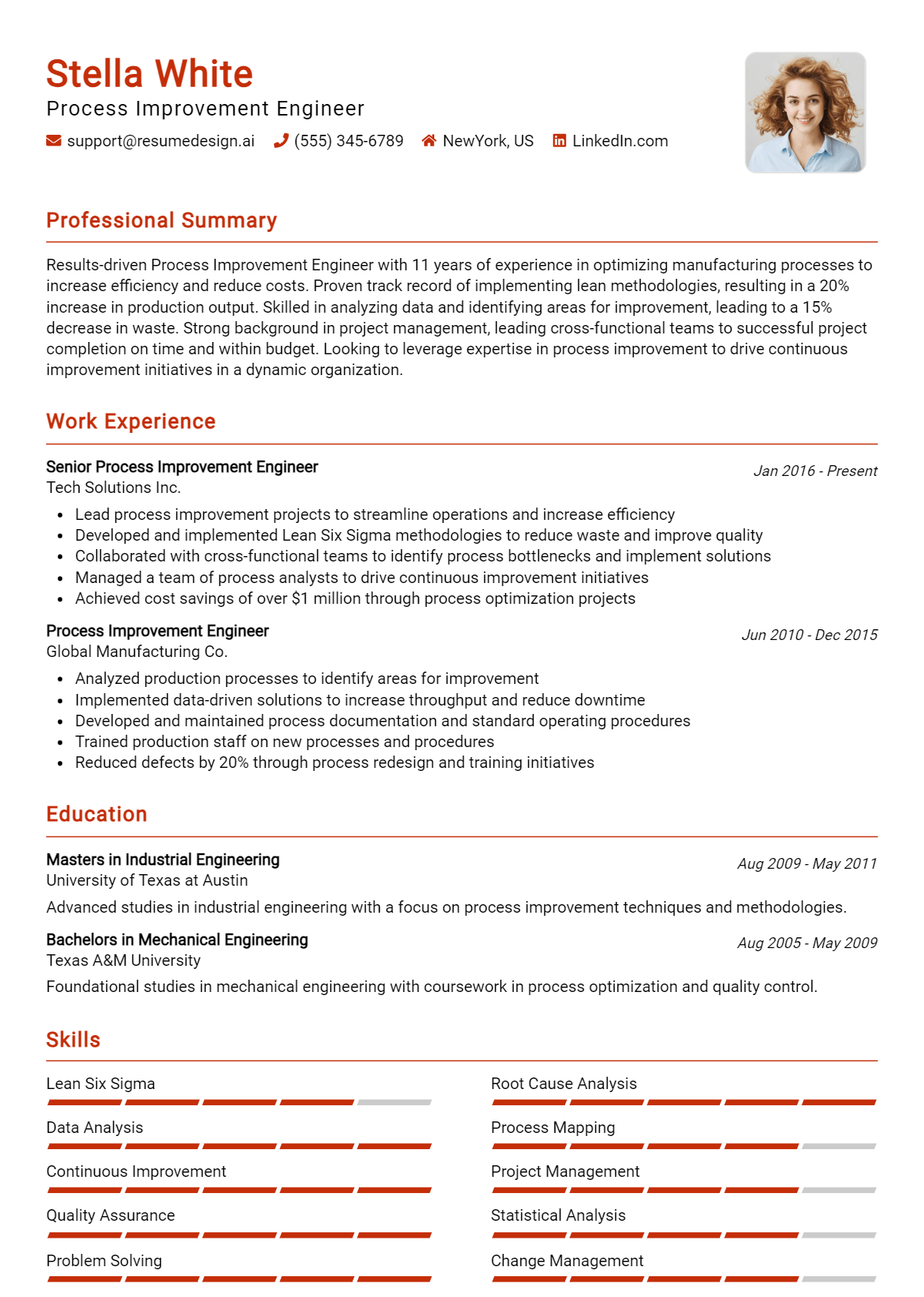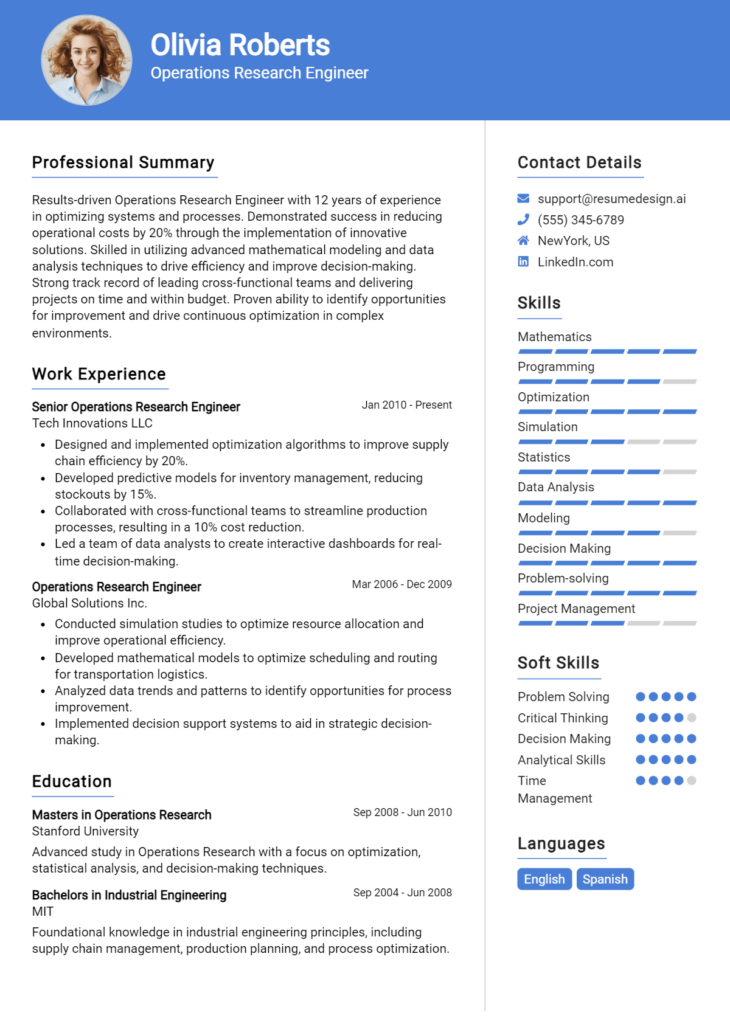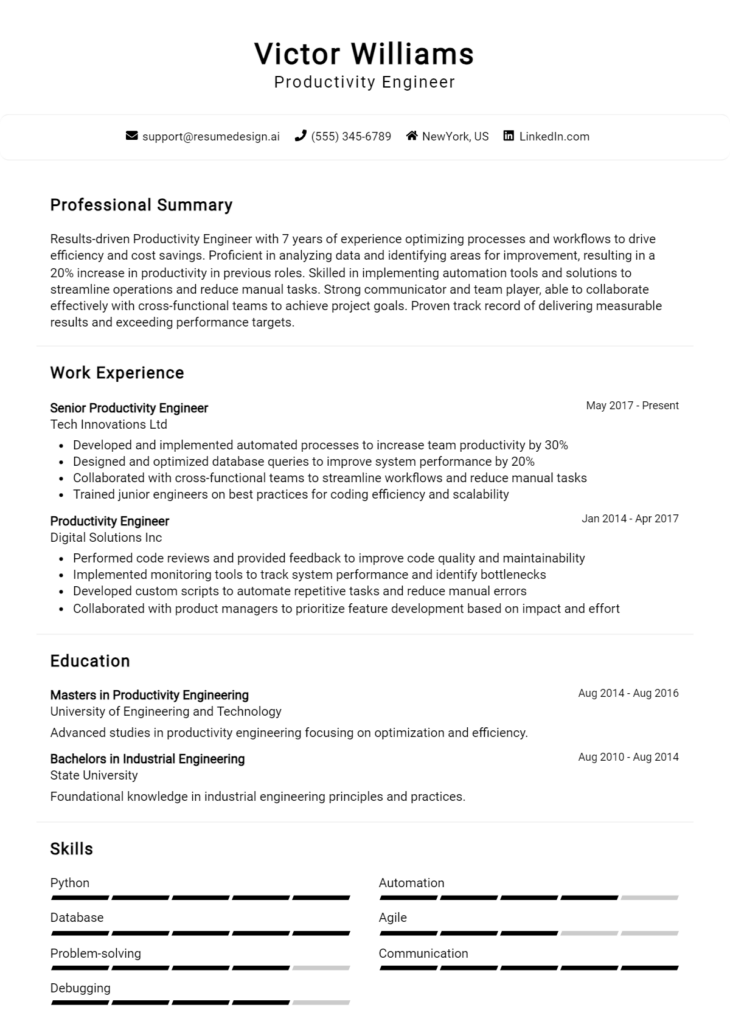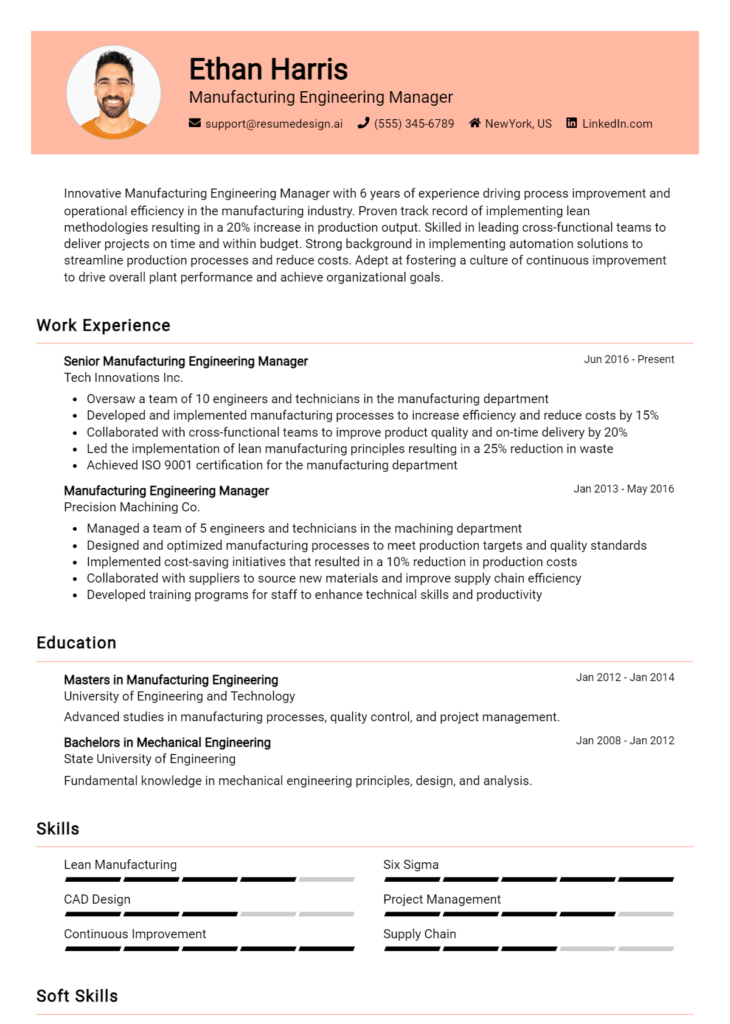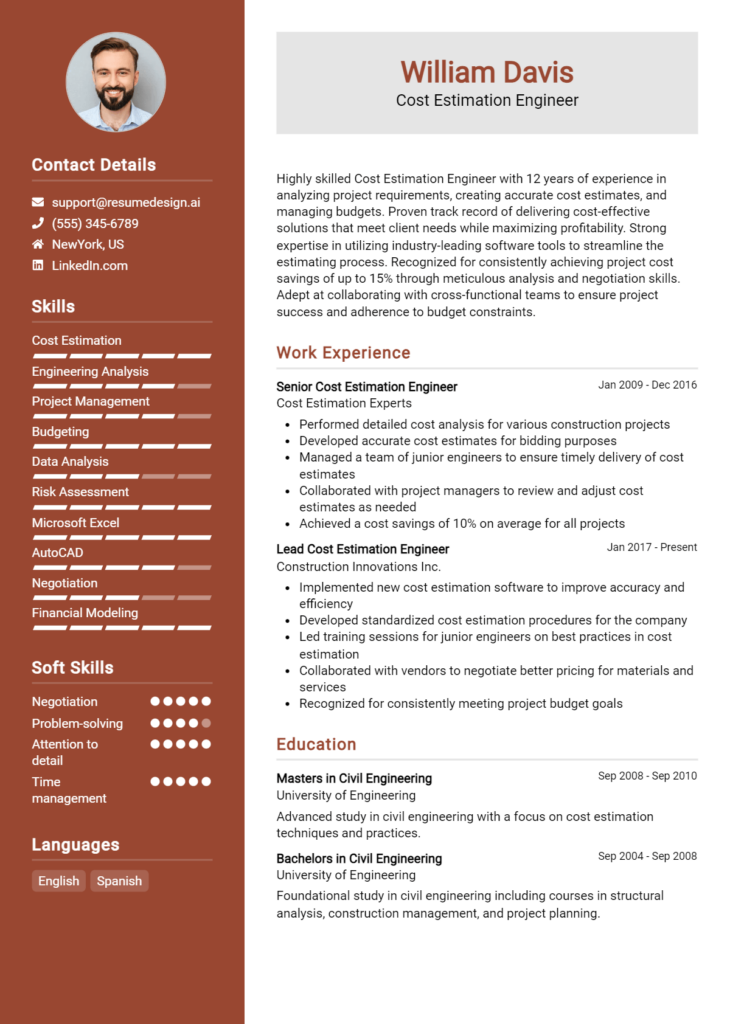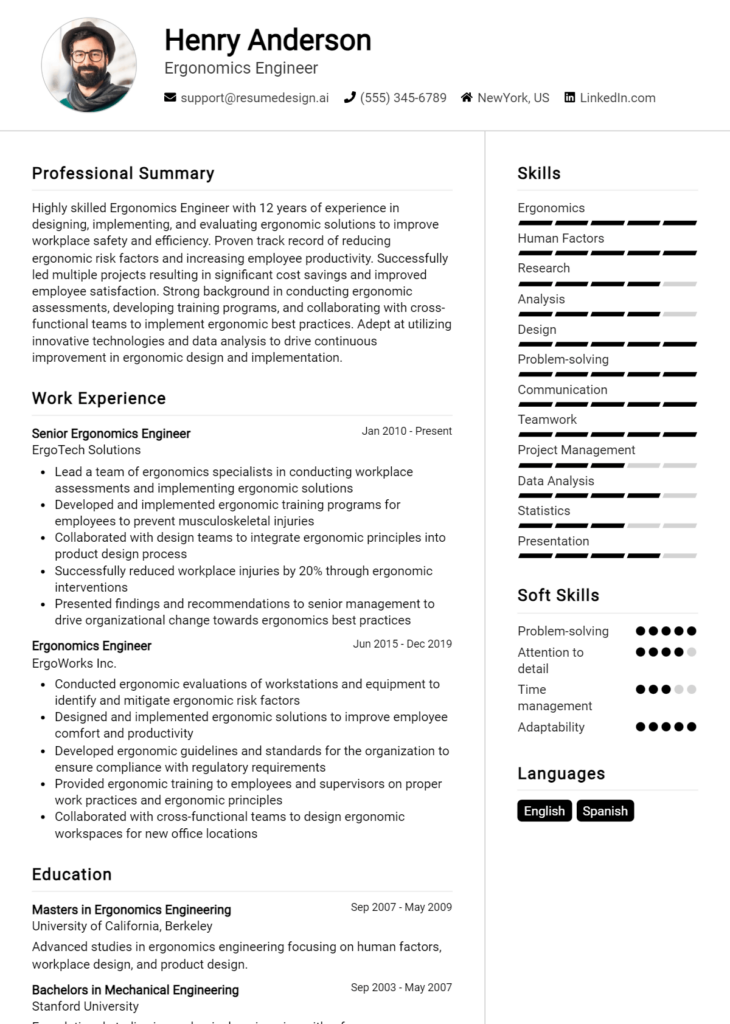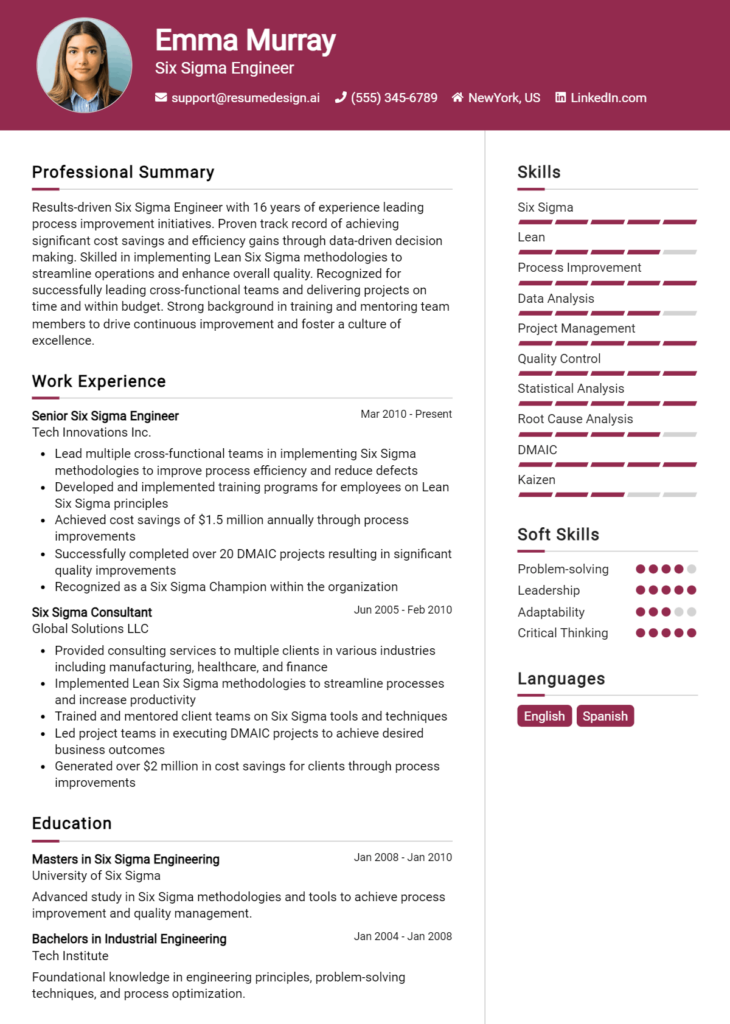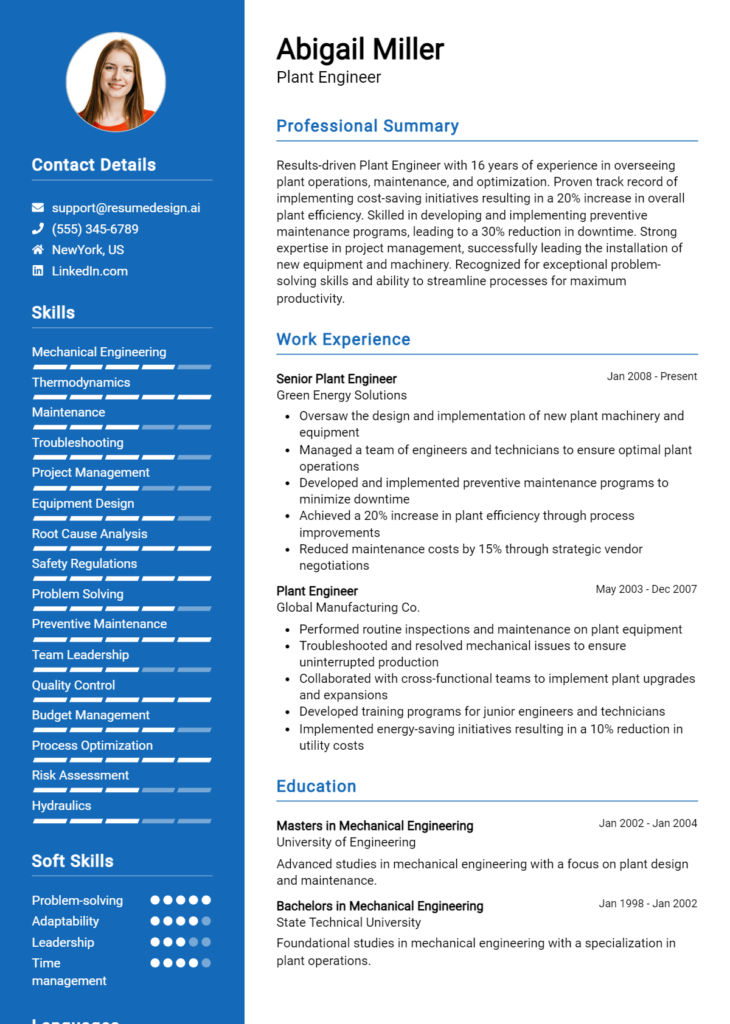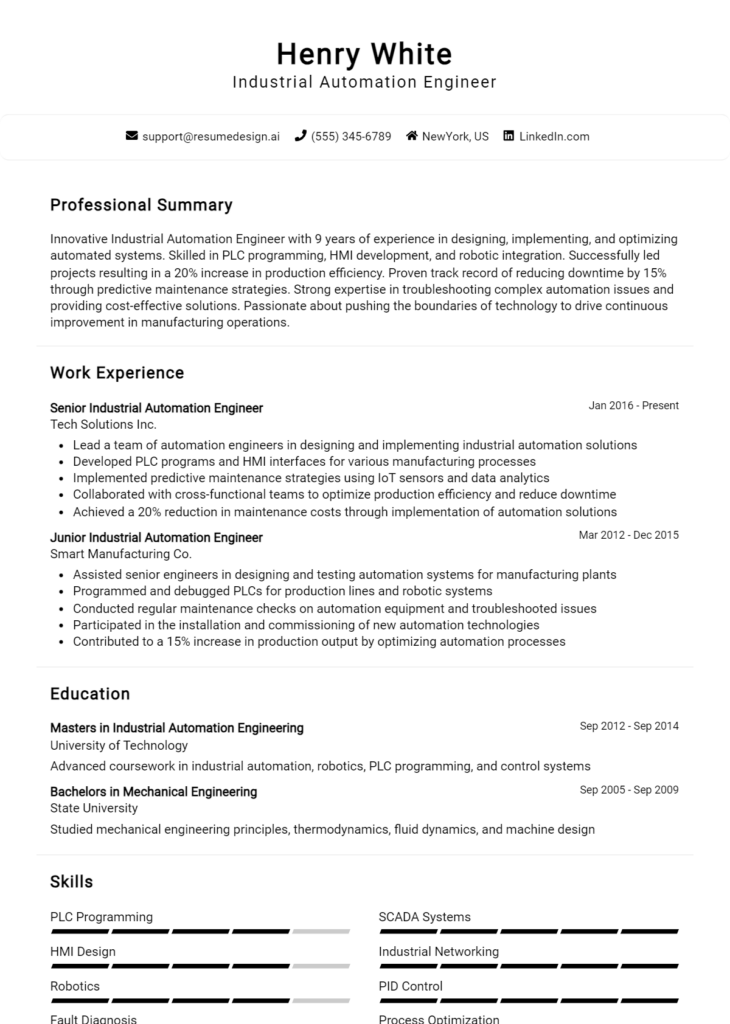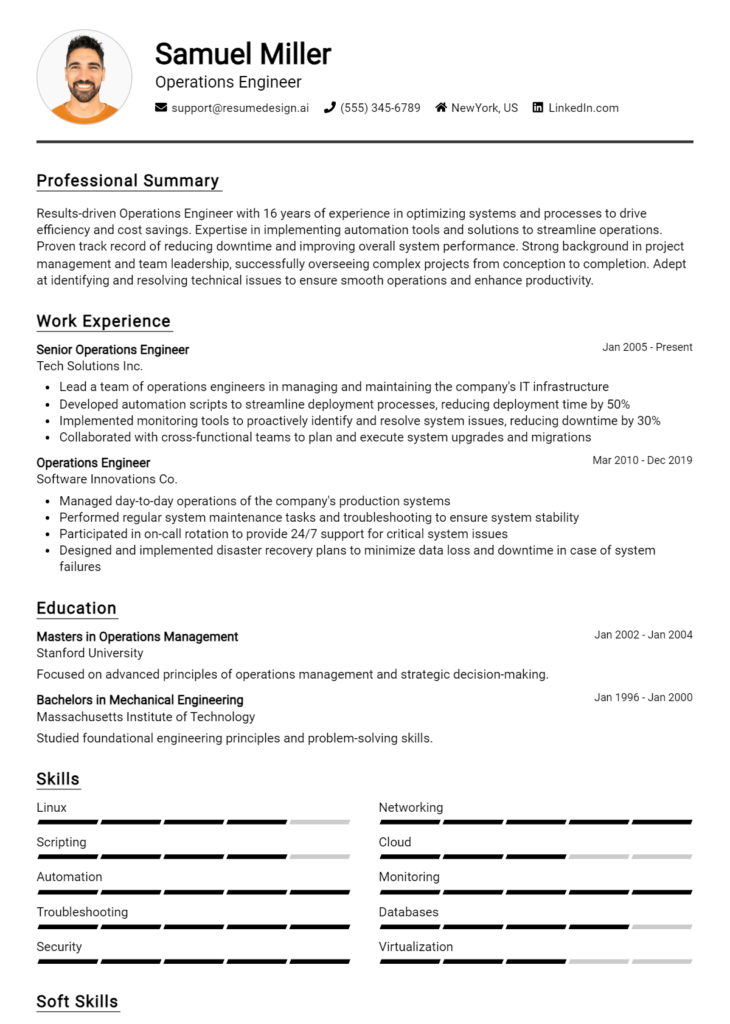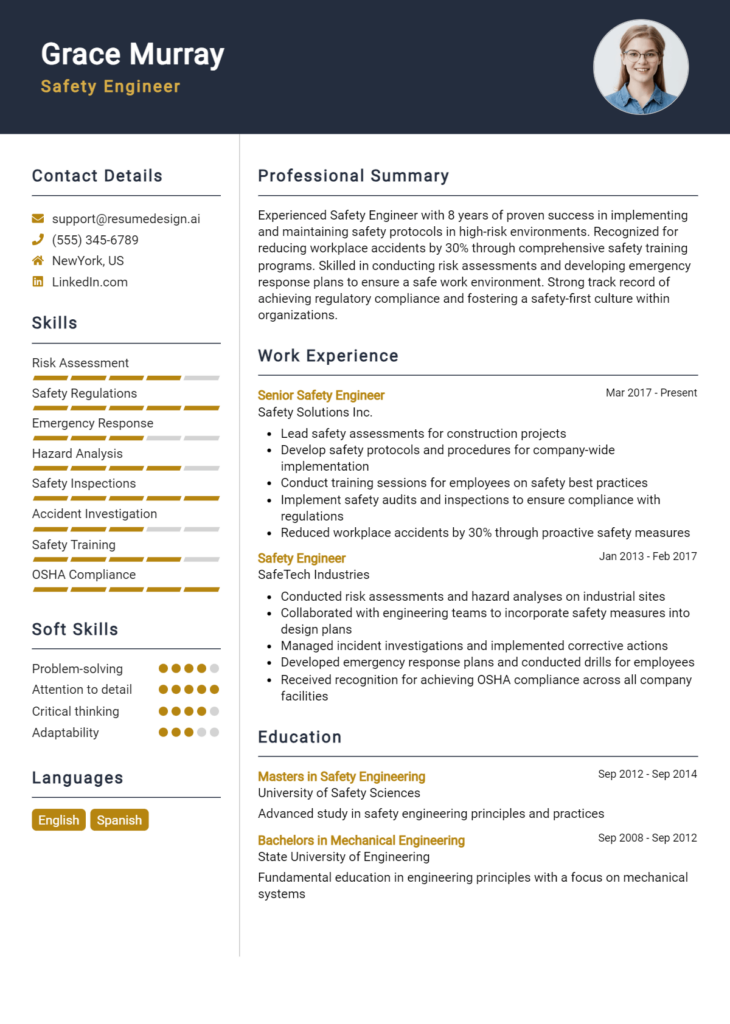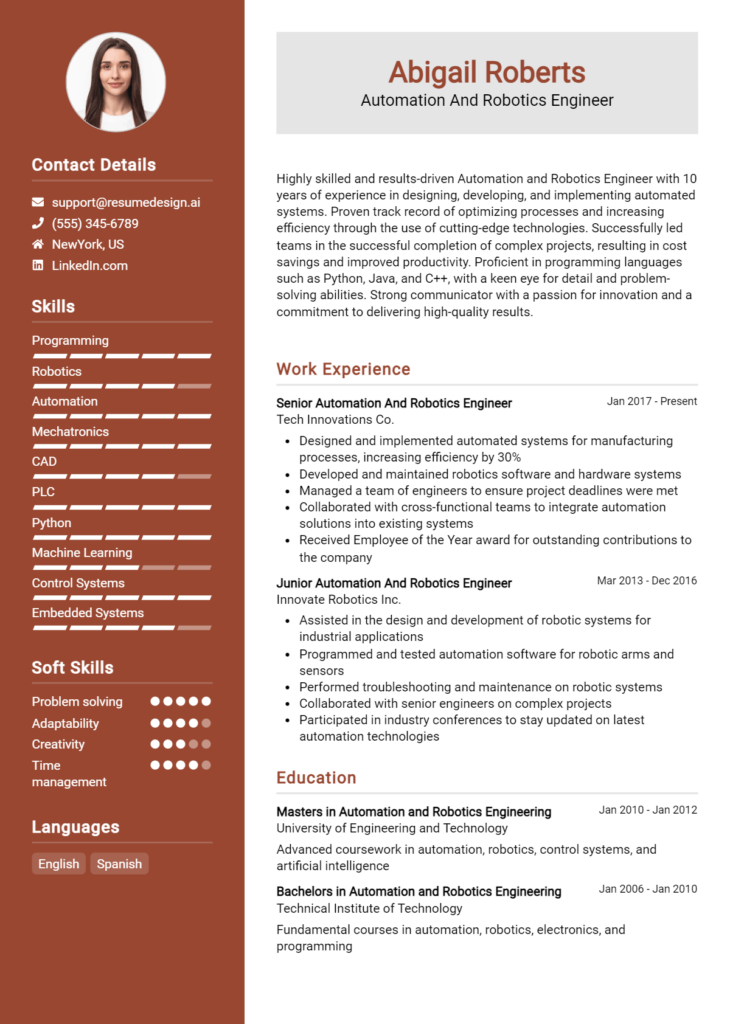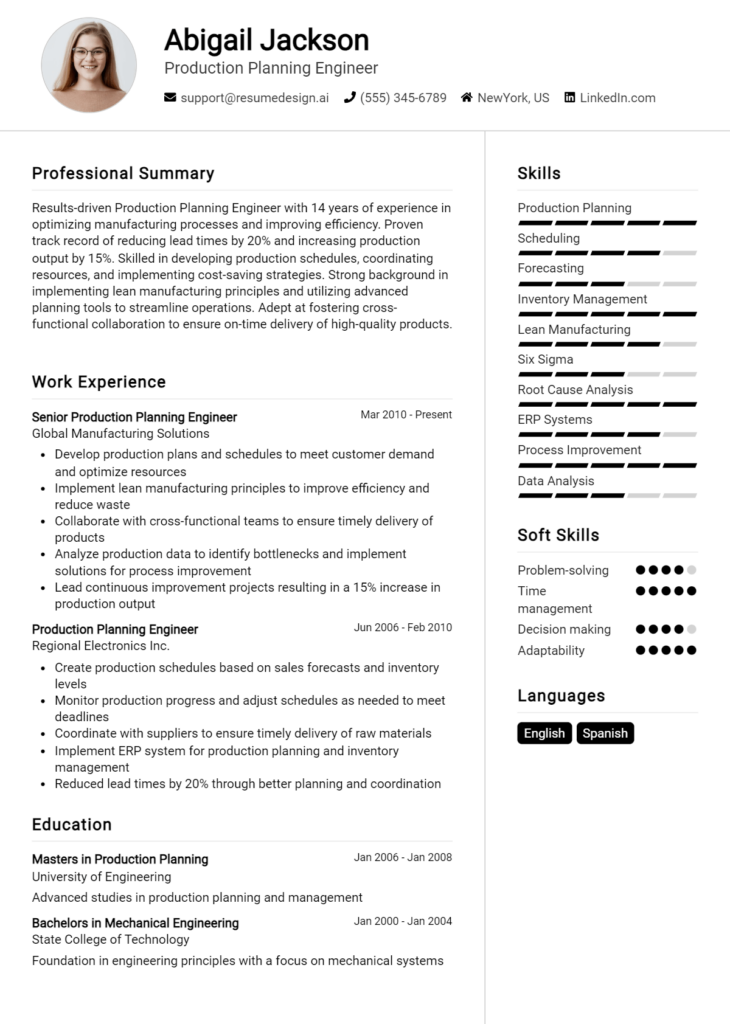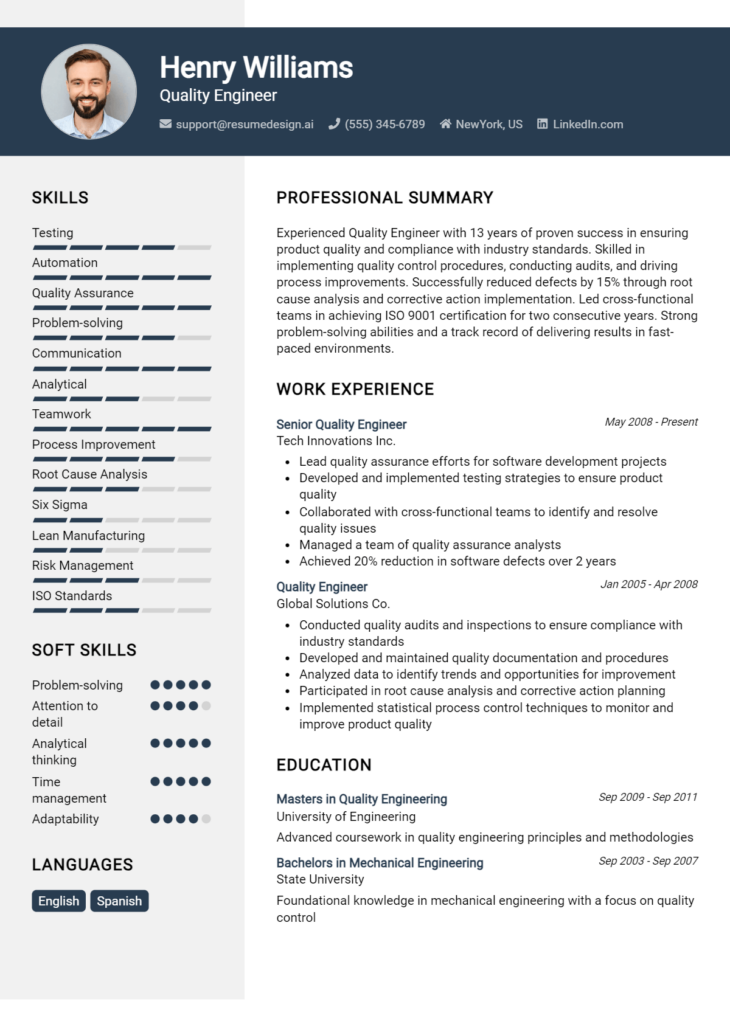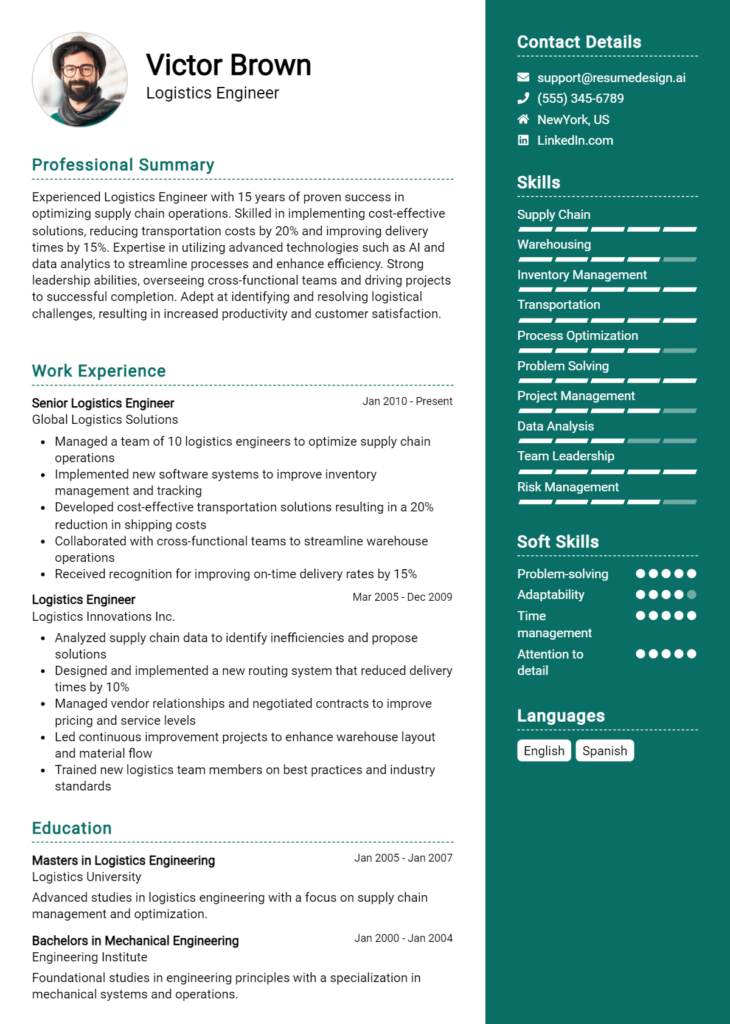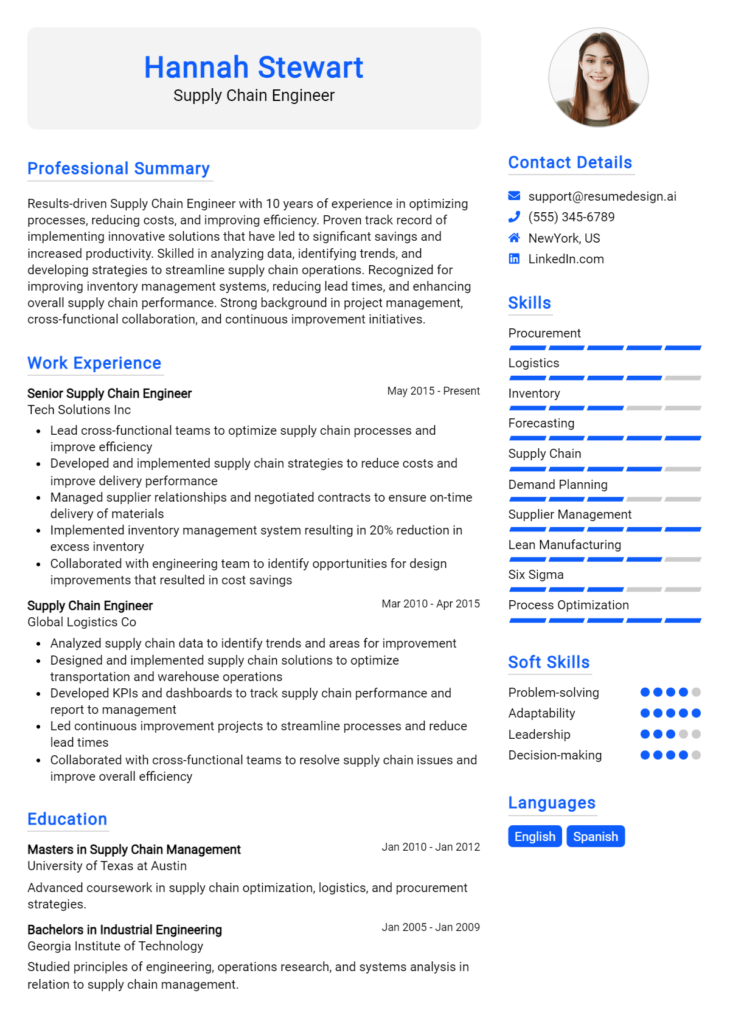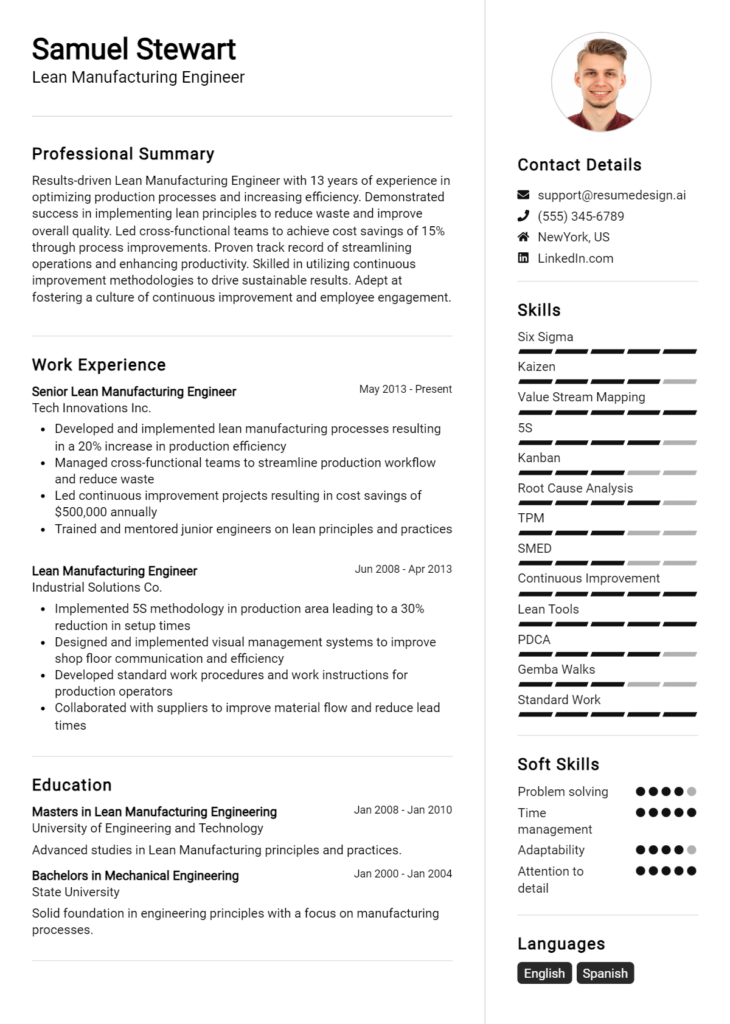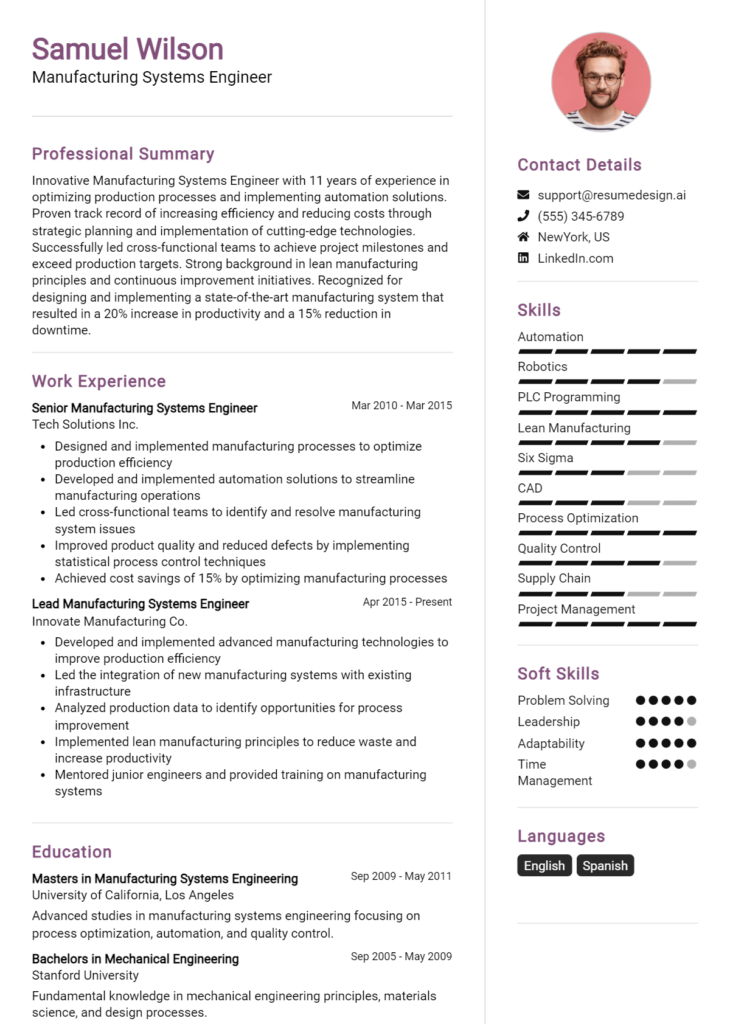Process Improvement Engineer Core Responsibilities
A Process Improvement Engineer plays a crucial role in enhancing operational efficiency across various departments by analyzing current processes, identifying bottlenecks, and implementing effective solutions. This professional must possess strong technical, operational, and problem-solving skills to bridge gaps between teams, facilitating collaboration and innovation. Their expertise directly contributes to an organization's strategic goals, making it essential to highlight these qualifications through a well-structured resume that showcases relevant achievements and experiences.
Common Responsibilities Listed on Process Improvement Engineer Resume
- Analyze existing processes and workflows to identify areas for improvement.
- Develop and implement process improvement plans to enhance efficiency.
- Collaborate with cross-functional teams to drive change initiatives.
- Utilize data analysis tools to monitor process performance metrics.
- Conduct root cause analysis to resolve operational issues.
- Facilitate training sessions for staff on new procedures and tools.
- Document process changes and maintain updated standard operating procedures.
- Lead continuous improvement projects using methodologies such as Lean and Six Sigma.
- Present findings and recommendations to management stakeholders.
- Assess the impact of changes on overall business objectives.
- Maintain compliance with industry regulations and standards.
High-Level Resume Tips for Process Improvement Engineer Professionals
In the competitive landscape of engineering, a well-crafted resume serves as a crucial gateway for Process Improvement Engineer professionals seeking to make a strong first impression on potential employers. Your resume is often the first glimpse hiring managers have of your skills, experiences, and achievements, making it essential to reflect your capabilities in a clear and compelling manner. A strategic resume not only showcases your qualifications but also tells the story of how you can add value to an organization. This guide will provide practical and actionable resume tips specifically tailored for Process Improvement Engineer professionals, ensuring you present yourself as the ideal candidate for any role.
Top Resume Tips for Process Improvement Engineer Professionals
- Tailor your resume to each job application by incorporating keywords from the job description to demonstrate alignment with the role.
- Highlight relevant experience, emphasizing roles where you successfully implemented process improvements or efficiency strategies.
- Quantify your achievements with metrics, such as reduced cycle times, increased throughput, or cost savings, to showcase the tangible impact of your work.
- Include industry-specific skills, such as Six Sigma certification, Lean methodologies, or project management experience, to stand out in your field.
- Utilize action verbs to describe your responsibilities and accomplishments, making your contributions clear and impactful.
- Keep your resume concise, ideally one page, focusing on the most relevant information that aligns with the job you’re applying for.
- Incorporate a summary statement at the top of your resume that encapsulates your experience, skills, and career goals in process improvement.
- Consider using a clean and professional format that enhances readability and highlights key sections, such as experience and education.
- Proofread your resume meticulously to eliminate any spelling or grammatical errors, which can detract from your professionalism.
By implementing these tips, you can significantly enhance your resume's effectiveness, thereby increasing your chances of landing a job in the Process Improvement Engineer field. A focused and polished resume not only showcases your qualifications but also positions you as a proactive and detail-oriented candidate, qualities that are highly sought after in process improvement roles.
Why Resume Headlines & Titles are Important for Process Improvement Engineer
In the competitive landscape of job applications, a well-crafted resume headline or title serves as a powerful tool for Process Improvement Engineers. This element is crucial as it offers hiring managers an immediate glimpse into a candidate's qualifications, skills, and potential contributions to their organization. A strong headline can effectively encapsulate the essence of a candidate's expertise, making it easier for recruiters to identify the right fit for their needs. Therefore, it is imperative that this phrase be concise, relevant, and directly aligned with the job being applied for, ensuring it captures attention and invites further exploration of the resume.
Best Practices for Crafting Resume Headlines for Process Improvement Engineer
- Keep it concise: Aim for a headline that is short and to the point, ideally under 10 words.
- Be role-specific: Tailor the headline to reflect the specific role of a Process Improvement Engineer.
- Highlight key skills: Include essential skills or certifications that are relevant to the job.
- Use action verbs: Start with strong action verbs to convey a sense of proactivity and impact.
- Incorporate numbers: Where applicable, use metrics or accomplishments to add credibility and specificity.
- Focus on value: Clearly communicate the value you bring to potential employers.
- Avoid clichés: Steer clear of overused phrases that do not add value to your application.
- Revise for clarity: Ensure the headline is easily understood and free of jargon.
Example Resume Headlines for Process Improvement Engineer
Strong Resume Headlines
"Certified Six Sigma Black Belt Driving Continuous Improvement Initiatives"
"Process Improvement Engineer with Proven Track Record of 30% Cost Reduction"
"Lean Manufacturing Expert Specializing in Waste Reduction and Efficiency"
"Results-Driven Process Improvement Engineer with 8 Years of Experience in Aerospace Industry"
Weak Resume Headlines
"Engineer Looking for a Job"
"Experienced Professional"
"Process Improvement Engineer with Various Skills"
The strong headlines are effective because they convey specific strengths, expertise, and measurable accomplishments that directly relate to the role of a Process Improvement Engineer. They are tailored to attract the attention of hiring managers who are seeking candidates with proven results and relevant experience. In contrast, the weak headlines fail to impress due to their vagueness and lack of specificity, making it difficult for recruiters to discern the candidate's qualifications or unique value proposition.
Writing an Exceptional Process Improvement Engineer Resume Summary
A resume summary is a critical component for a Process Improvement Engineer, as it serves as the first impression a hiring manager will have of a candidate. A well-crafted summary quickly captures attention by succinctly showcasing key skills, relevant experience, and notable accomplishments that align with the job role. This brief yet impactful section should be tailored specifically to the position being applied for, clearly articulating how the candidate's expertise can contribute to the organization's process optimization goals. A strong summary not only highlights the candidate's qualifications but also sets the tone for the rest of the resume, making it essential for standing out in a competitive job market.
Best Practices for Writing a Process Improvement Engineer Resume Summary
- Quantify Achievements: Use specific numbers to demonstrate the impact of your contributions, such as cost savings or efficiency improvements.
- Focus on Relevant Skills: Highlight the skills that are most pertinent to the Process Improvement Engineer role, such as Lean Six Sigma, data analysis, or project management.
- Tailor to the Job Description: Customize your summary to reflect the specific requirements and responsibilities listed in the job posting.
- Keep it Concise: Aim for 3-5 sentences that deliver a powerful message without overwhelming the reader.
- Use Action Verbs: Start sentences with strong action verbs to convey your achievements and responsibilities dynamically.
- Showcase Problem-Solving Abilities: Highlight experiences where you identified and resolved process inefficiencies.
- Include Industry-Specific Language: Use terminology that resonates with the industry you are applying to, enhancing your credibility.
- Highlight Team Collaboration: Emphasize experiences that involve working with cross-functional teams to implement process improvements.
Example Process Improvement Engineer Resume Summaries
Strong Resume Summaries
Results-driven Process Improvement Engineer with over 5 years of experience in implementing Lean methodologies, achieving a 30% reduction in operational costs for multiple projects. Skilled in data analysis and process mapping, with a proven track record of enhancing efficiency and productivity in manufacturing settings.
Detail-oriented Process Improvement Engineer with a strong background in Six Sigma principles, successfully leading a team that improved production line efficiency by 40%, resulting in an annual savings of $250,000. Adept at identifying process bottlenecks and driving cross-functional initiatives.
Innovative Process Improvement Engineer with expertise in continuous improvement strategies, having facilitated workshops that decreased cycle times by 25% and improved quality control metrics by 15%. Passionate about leveraging data-driven decision-making to optimize operational workflows.
Weak Resume Summaries
Experienced engineer looking to improve processes and make things better.
Process Improvement Engineer with some experience in various projects and a desire to contribute to the company.
The strong resume summaries are considered effective because they provide specific, quantifiable results and directly relate to the skills and experiences necessary for a Process Improvement Engineer role. They demonstrate a clear understanding of the impact the candidate can make within the organization. In contrast, the weak summaries lack specificity, fail to showcase measurable achievements, and come across as generic or unfocused, making it difficult for hiring managers to gauge the candidate's true value. A compelling summary is essential for making a strong first impression and increasing the chances of securing an interview.
Work Experience Section for Process Improvement Engineer Resume
The work experience section of a Process Improvement Engineer resume is critical as it serves as a testament to the candidate's technical capabilities, leadership skills, and their ability to deliver high-quality results within a team environment. This section not only showcases the practical application of engineering principles and methodologies but also highlights the candidate's achievements in driving process improvements that align with industry standards. By quantifying accomplishments and demonstrating a clear impact on productivity, efficiency, and cost savings, candidates can effectively communicate their value to potential employers.
Best Practices for Process Improvement Engineer Work Experience
- Use quantifiable metrics to demonstrate success, such as percentage improvements or cost reductions.
- Highlight specific methodologies employed, such as Lean, Six Sigma, or Kaizen.
- Showcase teamwork and collaboration by mentioning cross-functional teams or leadership roles.
- Describe challenges faced and how innovative solutions were implemented to overcome them.
- Include relevant industry certifications or training that enhance credibility.
- Tailor experiences to match the job description for each application.
- Emphasize contributions to product quality and customer satisfaction.
- Maintain clarity and conciseness in wording to enhance readability.
Example Work Experiences for Process Improvement Engineer
Strong Experiences
- Led a cross-functional team in the implementation of Lean methodologies, resulting in a 30% reduction in cycle time and a 15% decrease in operational costs.
- Developed and executed a Six Sigma project that improved product quality, achieving a 99.5% defect-free rate and saving the company $200,000 annually.
- Collaborated with engineering and production teams to redesign a key manufacturing process, which increased throughput by 25% while reducing waste by 40%.
- Facilitated training sessions on process improvement techniques for over 50 staff members, fostering a culture of continuous improvement across the organization.
Weak Experiences
- Worked on various projects to improve processes.
- Assisted in team meetings and contributed ideas.
- Helped with documentation and reporting tasks.
- Participated in some training sessions related to process improvement.
The examples provided illustrate a clear distinction between strong and weak experiences. The strong experiences are characterized by specific achievements, quantifiable results, and demonstrable leadership in process improvement initiatives. They convey a sense of impact and expertise that aligns strongly with the requirements of a Process Improvement Engineer role. In contrast, the weak experiences lack specificity, fail to quantify contributions, and do not showcase significant accomplishments or leadership, making them less compelling to potential employers.
Education and Certifications Section for Process Improvement Engineer Resume
The education and certifications section of a Process Improvement Engineer resume is a crucial component that showcases the candidate's academic achievements and commitment to professional development. This section not only highlights the relevant degrees and certifications that establish the candidate's qualifications but also reflects their dedication to continuous learning in the field of process improvement. By including pertinent coursework, industry-recognized certifications, and specialized training, candidates can significantly enhance their credibility and demonstrate alignment with the requirements of the job role, ultimately making a stronger case for their suitability in a competitive job market.
Best Practices for Process Improvement Engineer Education and Certifications
- Prioritize degrees in engineering, industrial engineering, or related fields that are directly applicable to process improvement.
- Include industry-recognized certifications such as Six Sigma, Lean Manufacturing, or PMP to validate expertise.
- Provide details on relevant coursework that demonstrates knowledge in statistics, quality control, or process analysis.
- Highlight any specialized training or workshops attended that pertain to process improvement methodologies.
- Ensure the information is presented in a clear and organized manner for easy readability.
- Keep the section updated with any new certifications or coursework to reflect ongoing professional development.
- Use specific and quantifiable achievements during education or training to underscore capabilities.
- Avoid including outdated or irrelevant qualifications that do not contribute to the role of a Process Improvement Engineer.
Example Education and Certifications for Process Improvement Engineer
Strong Examples
- Bachelor of Science in Industrial Engineering, University of XYZ, 2020
- Certified Six Sigma Green Belt, ASQ, 2022
- Lean Manufacturing Certification, Institute of Lean, 2021
- Relevant Coursework: Operations Research, Quality Management Systems, Statistical Process Control
Weak Examples
- Bachelor of Arts in History, University of ABC, 2018
- Certification in Personal Development Coaching, 2019
- Basic Microsoft Office Skills Course, 2020
- High School Diploma, 2016
The strong examples are considered effective as they directly relate to the field of process improvement, featuring relevant degrees and recognized certifications that enhance the candidate's qualifications. In contrast, the weak examples illustrate qualifications that are either irrelevant to the role or outdated, failing to demonstrate the necessary technical skills and industry knowledge required for a Process Improvement Engineer position.
Top Skills & Keywords for Process Improvement Engineer Resume
As a Process Improvement Engineer, showcasing the right skills on your resume is crucial for standing out in a competitive job market. Employers seek candidates who possess a blend of technical expertise and interpersonal abilities to effectively analyze processes, identify inefficiencies, and implement solutions. Highlighting both hard and soft skills demonstrates your capacity to not only understand complex systems but also to work collaboratively with teams to drive meaningful change. This balance is essential for fostering an environment of continuous improvement and achieving organizational goals. For more insights on how to effectively integrate skills and work experience into your resume, consider the following key skills specific to the role of a Process Improvement Engineer.
Top Hard & Soft Skills for Process Improvement Engineer
Soft Skills
- Analytical Thinking
- Problem-Solving
- Communication Skills
- Team Collaboration
- Adaptability
- Leadership
- Project Management
- Attention to Detail
- Critical Thinking
- Time Management
- Conflict Resolution
- Decision Making
- Creativity
Hard Skills
- Lean Manufacturing Principles
- Six Sigma Methodology
- Data Analysis Tools (e.g., Excel, SQL)
- Process Mapping Techniques
- Quality Control Systems
- Statistical Process Control (SPC)
- Value Stream Mapping (VSM)
- Root Cause Analysis
- Workflow Optimization
- Project Management Software (e.g., MS Project, Asana)
- Regulatory Compliance Knowledge
- Audit and Assessment Techniques
- Business Process Reengineering (BPR)
Stand Out with a Winning Process Improvement Engineer Cover Letter
Dear [Hiring Manager's Name],
I am excited to apply for the Process Improvement Engineer position at [Company Name], as advertised on [Job Board/Company Website]. With a solid background in engineering and a passion for optimizing processes, I am eager to bring my expertise in Lean methodologies and Six Sigma practices to your esteemed organization. My experience in analyzing workflows, identifying inefficiencies, and implementing innovative solutions aligns well with your goals for continuous improvement and operational excellence.
In my previous role at [Previous Company Name], I successfully led a cross-functional team to streamline production processes, which resulted in a 20% reduction in cycle time and a significant decrease in operational costs. By employing data-driven analysis and engaging stakeholders at all levels, I was able to foster a culture of collaboration and accountability. My hands-on approach to problem-solving, combined with my strong analytical skills, enables me to identify root causes and develop effective strategies that drive measurable results.
I am particularly impressed by [Company Name]'s commitment to innovation and sustainability, which resonates with my personal and professional values. I am eager to contribute to your vision by leveraging my ability to implement best practices and foster an environment of continuous learning. I am confident that my technical acumen, project management experience, and passion for process improvement will make a significant impact on your team.
Thank you for considering my application. I am looking forward to the opportunity to discuss how my background, skills, and enthusiasms can contribute to the success of [Company Name]. I am excited about the possibility of working together to enhance operational efficiencies and drive sustainable growth.
Sincerely,
[Your Name]
[Your LinkedIn Profile or Personal Website]
[Your Phone Number]
[Your Email Address]
Common Mistakes to Avoid in a Process Improvement Engineer Resume
When crafting a resume for a Process Improvement Engineer position, it’s crucial to present your skills and experiences in a way that stands out to potential employers. However, many candidates make common mistakes that can detract from their qualifications. Being aware of these pitfalls can help you create a more effective resume that highlights your strengths and aligns with the job requirements. Here are some frequent missteps to avoid:
Failing to Tailor the Resume: Sending out a generic resume without customizing it for the specific job can make you seem uninterested or unqualified. Always align your skills and experiences with the job description.
Overloading with Technical Jargon: While it’s important to showcase your technical expertise, using excessive jargon can alienate hiring managers. Aim for clarity and simplicity to ensure your message is understood.
Neglecting Quantifiable Achievements: Listing responsibilities without quantifying your accomplishments can make your contributions seem less significant. Use metrics to demonstrate the impact of your work (e.g., "Reduced cycle time by 30%").
Inconsistent Formatting: A resume that lacks consistent formatting can be distracting and unprofessional. Use uniform fonts, bullet points, and spacing to create a clean and organized look.
Ignoring Soft Skills: Process improvement isn’t purely technical; soft skills like communication and teamwork are vital. Failing to highlight these can give an incomplete picture of your capabilities.
Using Passive Language: Phrasing your experiences in passive voice can undermine your contributions. Use active language to convey your role and impact more powerfully (e.g., “Led a team” instead of “Was part of a team that led”).
Omitting Relevant Certifications: Certifications in process improvement methodologies (like Six Sigma or Lean) can set you apart. Ensure you list any relevant credentials prominently.
Including Irrelevant Information: Adding unrelated work experiences or outdated skills can clutter your resume. Focus on information that directly relates to process improvement to maintain relevance and clarity.
Conclusion
As a Process Improvement Engineer, your role is critical in identifying inefficiencies and developing strategies to enhance operational processes. Throughout this article, we discussed the essential skills and qualifications that employers seek, including analytical abilities, strong communication skills, and proficiency in methodologies like Lean and Six Sigma. Additionally, we covered the importance of showcasing your accomplishments, such as successful projects or quantifiable improvements, to stand out in the competitive job market.
Now is the perfect time to revisit your Process Improvement Engineer resume and ensure it effectively highlights your strengths and achievements. Take advantage of available resources to enhance your application. Explore resume templates that can provide a professional layout, utilize the resume builder for a streamlined creation process, and review resume examples for inspiration on how to present your experience compellingly. Additionally, don’t forget the significance of a well-crafted cover letter; check out our cover letter templates to help you make a great first impression.
By taking these steps, you can ensure that your resume not only reflects your qualifications but also captures the attention of potential employers. Start refining your resume today to set yourself up for success in your job search!

